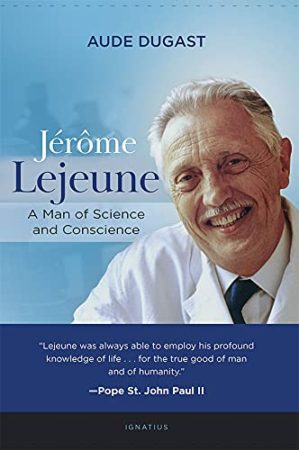Donald DeMarco
Review
Jérôme Lejeune: A Man of Science and Conscience by Aude Dugast, translated by Michael J. Miller (Ignatius Press, $20, 393 pages).
 This, Jérôme Lejeune: A Man of Science and Conscience by Aude Dugast, is a work to be cherished. “The world needs this book,” states Fr. Frank Pavone, national director of Priests for Life, “because the world needs to know Jérôme Lejeune”. What better testimony could there be in its behalf than for Lejeune’s widow to say: “Jérôme is present in this book”? What better testimony could there be for Lejeune’s saintly character than for its author to be serving as postulator for his canonization?
This, Jérôme Lejeune: A Man of Science and Conscience by Aude Dugast, is a work to be cherished. “The world needs this book,” states Fr. Frank Pavone, national director of Priests for Life, “because the world needs to know Jérôme Lejeune”. What better testimony could there be in its behalf than for Lejeune’s widow to say: “Jérôme is present in this book”? What better testimony could there be for Lejeune’s saintly character than for its author to be serving as postulator for his canonization?
Dr. Lejeune is a member of that rare breed who combines science with saintliness. A few such extraordinary individuals come to mind: St. Albertus Magnus, St. Hildegard of Bingen, Blessed Nicolas Steno, Pierre Duhem, Gregor Mendel, Blessed Guadalupe Ortiz, and Fr. Georges Lemaître.
Lejeune discovered that Down syndrome is caused by an extra copy of chromosome 21. He also identified several other diseases caused by chromosomal abnormalities. For this he was fully deserving of the Nobel Prize. His staunch commitment to life, however, did not set well with the powers who held the reigns of political correctness. He did earn the William Allen award, the world’s highest honoru for genetics.
The book’s epitaph is taken from St. Augustine: “No one can be a friend of mankind unless he is first a friend of truth.” Lejeune recognized and held firmly to the truth that the life of a human being begins at conception. In 1989, at a moment’s notice, and at his own expense, he left his laboratory in Paris and flew to Maryville, Tennessee, to defend the humanity and the right to life of seven frozen embryos. His expert testimony led Judge W. Dale Young to rule that the frozen embryos were “little children.” He therefore, awarded custody of the seven cryopreserved human embryos to the mother for the purpose of implantation. Lejeune saw them as “The Seven Hopes of Mary.” Appropriately, Dugast’s work is “Dedicated to the seven hopes of Mary.”
It was a source of great sorrow for Lejeune to witness the ongoing attempt to rid the world of Down syndrome children by aborting them. He had a more positive attitude. “Victory against Down’s syndrome—i.e., curing them of the ill effect of their genetic overdose—may not be too far off, if only the disease is attacked, not the babies.” “It belongs to science to say that a human being is a human being,” Lejeune wrote, “and then morality tells you: therefore, it is necessary to respect the human being.” The pattern of a good life is not difficult to see; its execution is the problem.
Lejeune was a close friend of Pope St. John Paul II, who praised the distinguished scientist for his integrity. “Lejeune was always able to employ his profound knowledge of life,” he stated, “for the true good of man and of humanity.” Pope John Paul II appointed him as the first president of the Pontifical Academy for Life.
Sheer thoroughness of research characterizes this book. Aude Dugast spent 11 years pouring over thousands of archives. She consulted at length with Lejeune’s wife and relatives, as well as families of his patients. The result is a highly detailed portrait of a man whose life was a model of integration, bringing into harmony his world-class work as a scientist, his devotion to his wife and five children, as well as his dedication to defending the right-to-life of the unborn. “These pages,” writes Birthe, Lejeune’s widow, “reveal that Aude Dugast has understood his (Lejeune’s) mind, in depth. And she relates his story with heart.”




